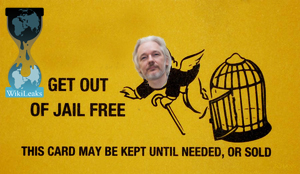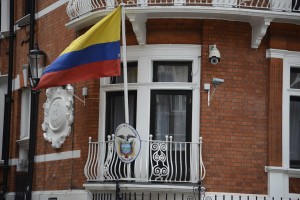I once was a supporter of Wikileaks and Julian Assange.
When I contributed to the Freedom of the Press Foundation years ago, I earmarked some of the funds for Wikileaks. And when I visited London in 2013, I dropped by the Ecuadorian Embassy, where Assange was holed up, out of respect for him and to take the photo below.
But that was before Assange sold his soul to elect Donald Trump.
Assange defended Wikileaks’ publishing of troves of material damaging to Clinton, but nothing about Trump, in a statement he issued on the eve of the U.S. election, saying,”To withhold the publication of such information until after the election would have been to favour one of the candidates above the public’s right to know.” Well, wasn’t that heroic of him!
What Assange didn’t say
It is favoring one of the candidates when you release a massive amount of damaging material on just the other candidate in the choreographed way—drip, drip, drip; day-by-day; week-after-week—that Wikileaks did, a rollout obviously calculated to do maximum damage to the targeted candidate. That is not what you do when you favor the public’s right to know.
It didn’t matter to Assange that the material he published, and its timing, were obviously orchestrated by parties with an interest in throwing the election to Trump, most likely the Russian government and, quite possibly, Trump supporters within the US Justice Department’s Trumpland Division (sometimes also known as the FBI).
Assange also admitted that he did have controversial material about Trump’s campaign that he chose not to publish because “it’s actually hard for us to publish much more controversial material than what comes out of Donald Trump’s mouth every second day.” In other words, Assange unilaterally decided to withhold material he had that was damaging to Trump: The “public’s right to know” be damned. Et tu, Julian?
I condemn the wholesale spying that the U.S. intelligence community has been conducting for years on the American public and that Edward Snowden exposed. But I do give our agencies enough credit to believe that they can determine whether the Russian government has been hacking into politically sensitive accounts.
Pardon moi?
Assange and his lawyers have recently said that they will appeal to the Trump Administration to end the U.S. government’s probe of Assange and Wikileaks and with it the threat that he will be arrested and extradited to the U.S. should he leave the London embassy.
They also said that their appeal is not new—certainly not an attempt to get a quid pro quo for having helped elect Trump—because they have been issuing the same appeal to the Obama Administration for years.
If you buy that, I’ve got some oceanfront property in Kansas for you.
Appealing to a hostile Obama administration is one thing. But it’s quite another to appeal to someone you’ve previously softened up by supplying his campaign with massive amounts of dirt on his opponent.
Surely no one is naive enough to think that Trump and his entourage don’t have a soft spot in their hearts now for Assange. Trump himself praised Wikileaks during the campaign.
Back in 2010, Sean Hannity, now Trump’s staunchest media ally, had said that Assange was “waging his war against the U.S.” by publishing documents, and asked, “why didn’t they arrest” Assange? “Why can’t Obama do something about the WikiLeaks?” Fast forward to 2016 and Wikileaks’ publication of anti-Clinton material. Suddenly Hannity is applauding Assange on the air, telling him, “I do hope you get free one day.”
Then there’s Trump cheerleader David Duke, a former Klan Imperial Wizard, who called Assange a national hero for getting Trump elected:
Don’t ignore the associations between Wikileaks and the Trump campaign. Back in August, well before Wikileaks published the Podesta e-mails, Trump advisor Roger Stone bragged publicly that they would be coming:
Get real.
No. Any appeal to Trump now for clemency is not a continuation of the years of appeals to Obama. It’s plain opportunism. The phrase pay to play comes to mind.
Don’t get me wrong. For years, I always thought that Assange was being wrongly persecuted for what had been an admirable public service. And I was among those saying, “Free Julian Assange.”
I still think Assange should be a free man. But let’s not pretend that he emerges from this election with much of his integrity. And to see him rewarded by Trump for throwing an election to the candidate favored by Russia and the Ku Kux Klan would be sickening.






